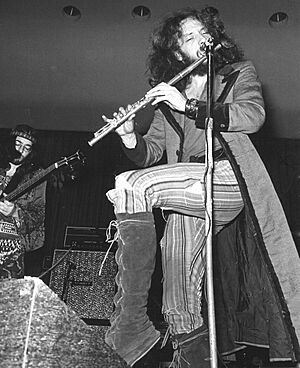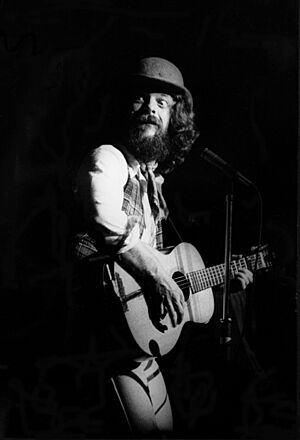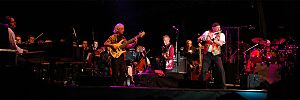Ian Anderson facts for kids
Quick facts for kids
Ian Anderson
|
|
|---|---|
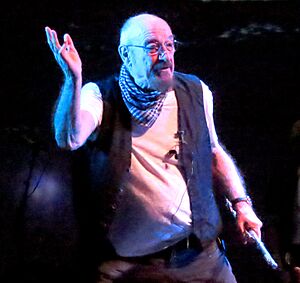
Anderson performing in 2024
|
|
| Background information | |
| Birth name | Ian Scott Anderson |
| Also known as | Laird of Strathaird |
| Born | 10 August 1947 Dunfermline, Scotland |
| Origin | Blackpool, Lancashire, England |
| Genres | |
| Occupation(s) |
|
| Instruments |
|
| Years active | 1962–present |
| Labels |
|
Ian Scott Anderson is a famous British musician, born on August 10, 1947. He is best known as the lead singer, flutist, and acoustic guitarist for the rock band Jethro Tull. Ian is a talented musician who can play many instruments, including harmonica, keyboard, and saxophone. He started releasing his own solo music in 1983 and has made several albums since then.
Contents
Early Life and Education
Ian Anderson was born in Dunfermline, Scotland. He was the youngest of three brothers. His family moved to Edinburgh when he was three years old. Ian was inspired by his father's collection of big band and jazz records. He also liked the new rock music that was becoming popular.
In 1959, Ian's family moved to Blackpool, England. He went to Blackpool Grammar School. Later, from 1964 to 1966, he studied fine art at Blackpool College of Art.
Music Career
Starting Out
When Ian was a teenager, he worked in a department store and at a news stand. In 1963, he formed a band called The Blades with his school friends. This band played soul and blues. Ian was the singer, guitarist, and harmonica player. He had not yet started playing the flute.
Ian decided to stop trying to be an electric guitar player. He felt he would never be as good as famous guitarists like Eric Clapton. So, he traded his electric guitar for a flute. After practicing for a few weeks, he found he could play the flute well in a rock and blues style. When Jethro Tull's first album, This Was, was recorded in 1968, he had only been playing the flute for a few months. He also continued to play acoustic guitar.
The One-Legged Stance
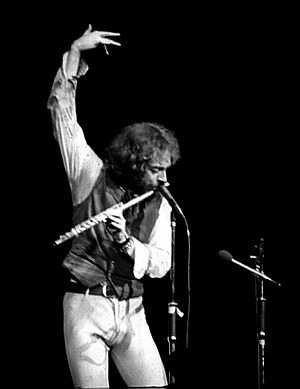
Ian Anderson became famous for standing on one leg while playing the flute. This happened by accident! He used to stand on one leg when playing the harmonica, holding the microphone stand for balance. A journalist mistakenly wrote that he stood on one leg to play the flute. Ian decided to try it, and it became his signature move. People sometimes called him a "deranged flamingo" because of this unique stance.
Later Music and Solo Work
Ian Anderson wanted to start a solo career in 1980. His first official solo album was Walk into Light in 1983. He later released other solo albums, including Divinities: Twelve Dances with God in 1995. This album featured many flute pieces. He also released The Secret Language of Birds in 2000 and Rupi's Dance in 2003.
In 2011, Ian began working on a sequel to Jethro Tull's 1972 album Thick as a Brick. The new album, called Thick as a Brick 2 or TAAB2, came out in 2012. He toured, performing both albums. In 2014, he released another solo album, Homo Erraticus, which was very successful.
In 2017, Ian announced a tour to celebrate Jethro Tull's 50th anniversary. The band released The Zealot Gene in 2022. This was the first Jethro Tull studio album with all new songs in 23 years.
Awards and Recognition
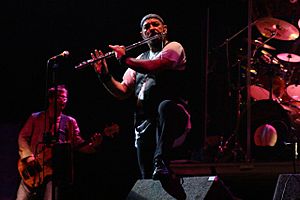
In 1973, Ian Anderson appeared on the cover of Time magazine. This was for an article about new music trends.
He has received several honors for his contributions to music. In 2006, he received the Ivor Novello Award for International Achievement. He also received an honorary degree from Heriot-Watt University.
In 2008, Ian was appointed a Member of the Order of the British Empire (MBE). This is a special award from the British government for his services to music. In 2011, he received another honorary degree from Abertay University. In 2013, he was given the "Prog God" award at the Progressive Music Awards.
Collaborations and Other Projects
Ian Anderson has worked with many other musicians. He produced albums for the band Steeleye Span and their member Maddy Prior. He played flute on the song "All Along You Knew" by Honeymoon Suite in 1985. In 1984, he recorded an album called A Classic Case with the London Symphony Orchestra, playing Jethro Tull songs.
He also played flute on songs for bands like Men Without Hats and Blackmore's Night. Ian performed with Uriah Heep on their live albums Acoustically Driven and Electrically Driven. He played flute on a song for Fairport Convention's album XXXV.
In 2011, Ian performed a flute duet with astronaut Cady Coleman. She was on the International Space Station at the time! This was to celebrate the 50th anniversary of the first human spaceflight. He also played flute on songs for The Darkness and Renaissance.
In 2017, an album called Jethro Tull – The String Quartets was released. It featured Ian Anderson with the Carducci String Quartet. Most recently, in 2024, Ian played flute and provided spoken words on tracks for the Swedish band Opeth's album The Last Will and Testament.
Personal Life
Ian Anderson is the youngest of three brothers. He was married to Jennie Franks from 1970 to 1974. She helped write some lyrics for the Jethro Tull song "Aqualung".
In 1976, Ian married Shona Learoyd. She used to work for Jethro Tull's record label. They have two children: James Duncan Anderson, who is also a musician, and Gael. Gael works in the film industry and is married to actor Andrew Lincoln.
Ian has been open about his health. He is a survivor of deep vein thrombosis, a condition where blood clots form in deep veins. He has helped raise awareness about this disease. In 2020, he shared that he has chronic obstructive pulmonary disease (COPD). He believes this might be partly due to the smoke machines used in live shows during his career. He manages his condition with medication and breathing exercises.
Ian enjoys protecting wild cats, especially those rescued from bad situations. He also likes cameras and Indian cuisine. He cares about the environment and grows trees on his farm to help reduce his carbon footprint.
Images for kids
-
Anderson plays flute in Zagreb, Croatia, 2018
See also
 In Spanish: Ian Anderson para niños
In Spanish: Ian Anderson para niños
 | Frances Mary Albrier |
 | Whitney Young |
 | Muhammad Ali |


